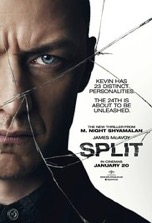Split (PG-13)
17/02/17 02:06 Filed in: 2017

Starring: James McAvoy
January 2017
What follows is the full-length review based on comments that were originally tweeted in Real-time from the back row of a movie theater @BackRoweReviews. Though efforts were made to tease rather than ruin this movie’s memorable lines and moments, some spoilers may exist in the following evaluation. For concerns over objectionable content, please first refer to one of the many parental movie guide websites. Ratings are based on a four star system. Happy reading!
Split is a devilishly deceptive film. It lures us into thinking it’s a standard Kiss the Girls (1997) style female abduction story and then morphs into a cognitively complex character study that delves into the darkly demented, spiritually skewed aspects of mental illness. The film wastes no time in initiating its plot as Kevin Crumb (James McAvoy in a turn for the ages) jumps into a car with three teen girls—Casey Cooke (Anya Taylor-Joy), Claire Benoit (Haley Lu Richardson) and Marcia (Jessica Sula)—sprays them in the face with Mace and whisks them away to his dingy underground lair. We soon discover that Kevin has dissociative identity disorder. We also quickly discern that Casey can adapt to Kevin’s shifting personalities, an ability that distinguishes her from the other prisoners and equips her with the wherewithal to make it out of the catacombs alive. The film splits its time between Kevin and Casey, revealing insightful bits of their back stories in flashback sequences, and adroitly graduates their interactions from a war of wills to a dance of the wounded…whereas Casey’s scars are physical and emotional, Kevin’s are psychological. As such, there’s an unspoken understanding that exists between these characters since they both know what it means to be deeply hurt by a family member. Even though we can’t justify Kevin’s actions, we can have sympathy for him since his mother’s controlling nature laid the foundation for his mental illness. What we can’t excuse, however, is what Uncle John (Brad William Henke) did to young Casey (Izzie Coffey) out in the woods…I firmly believe that there’s a special place in hell for such individuals. This prompts a topical, hypothetical question: what’s worse, a heinous crime committed by someone with a mental illness or an ostensibly sane person? One of the movie’s ongoing themes, a variation of Darwin’s “survival of the fittest” ideology, is revealed in its hunter/hunted subplot. Preteen Casey learns how to hunt a deer in one of her flashback sequences and Kevin/The Beast stalks his three captives during the movie’s X-Files style climax. Even more disturbing than the movie’s brief images of cannibalism, however, is its insidious intimation that “the broken are the more evolved” members of our species. That notion is fleshed out by another of the film’s unsettling lines, “What if they’re more than us?” The implication here, of course, is that people with multiple personalities are superior to those with just one—as if they possess superpowers like the mutants in the X-Men films (incidentally, McAvoy stars as Professor X in that franchise’s First Class movies). Just as the definition of gender has broadened to include a variety of mental/physical/sexual types in recent years (Facebook now offers 56 gender options to choose from when creating a profile and the January 2017 National Geographic cover article on the Gender Revolution presents its own codified gender matrix), the DSM has also expanded to include many new kinds of mental illnesses. So then, has the mainstreaming of a variety of sexual identities opened the door to the acceptance of new mental illnesses, and is there a connection between the two? In our society of broken families, fractured realities and shifting gender identities, are individuals with split personalities the wave of the future, and if so, how will we treat them and coexist with them? Not only has this seismic shift in the mental health landscape opened up a whole new classification of Civil Rights, it has also anticipated serious legal complications, i.e., can Kevin/The Beast be arrested for eviscerating his victims since that behavior is part of his nature? Kevin’s psychiatrist, Dr. Karen Fletcher (Betty Buckley), asks a poignant question in relation to Kevin’s case: “Is there a limit to what a human being can become?” Or, to put it a different way, is there a nadir to the depths of human depravity and derangement? With so much to mull over here, it’s clear that Split isn’t your standard issue thriller. Just as Kevin’s numerous alternate personas are stratified in a dysfunctional hierarchy, the movie itself contains many layers of meaning which have far-reaching ramifications for the human condition. Despite the occasional nitpick, i.e., psychiatrists don’t make house calls, Split is a thoroughly captivating yarn and comes complete with eerie, skin-crawling direction by Shyamalan, a mesmerizing lead performance by McAvoy and (Spoiler Alert) one of the finest stunt cameos/Easter eggs in cinema history with the brief appearance of Bruce Willis, whose one line links this film with Unbreakable (2000). Split qualifies as a considerable comeback for Shyamalan, who suffered an ignominious drought during his The Village (2004) through The Last Airbender (2010) years. Due to its performances and shocking subject matter, Split is sure to be a water cooler film…whether or not it’s a box office hit remains to be seen. Well, I’d love to chat more about this film but it’s time for me to split.